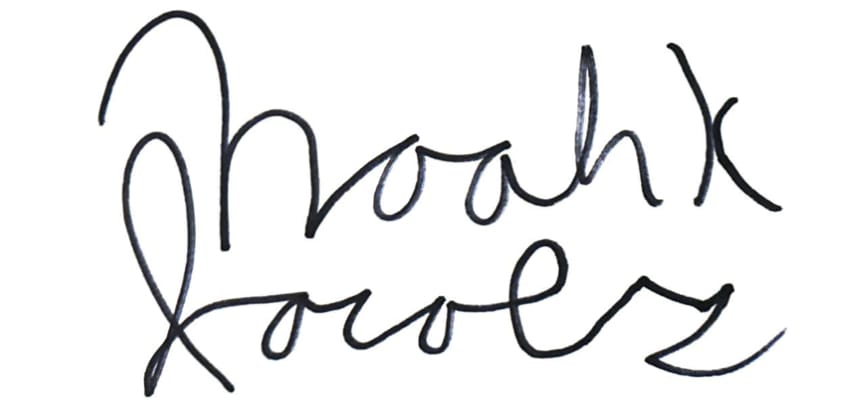- Noah Jacobs Blog
- Posts
- On Rewriting
On Rewriting
How you can make starting from 0 your superpower.
2025.10.26
CXXIII
[Pumpkins & Lego Towers; Rewrite, Don’t Edit; Judo Against a Tree; Building is a Verb; One Turn of Pitch and Toss]
Thesis: The more comfortable you are with restarting everything, the faster you'll get good at anything.
[Pumpkins & Lego Towers]
I heard an endearing story about my niece this week.
She spent all of this time carving a pumpkin for Halloween, and put it on her porch. Within an hour or two, an animal had eaten it.
She was devastated! I would be too, if I was 6.
When I was younger, I would get really, really attached to things I liked.
I would build something out of legos or draw something or come up with a story and get so proud of it, thinking it was the greatest thing I had ever created.
This masked an underlying insecurity & uncertainty: I was not confident in my ability to make something that awesome again. So, naturally, I would get really sad if the lego tower toppled.
Broadly, the process of growing up involves having a stronger sense of self esteem that is not drawn exclusively from some external artifact, like a Lego tower or a pumpkin.*
I’d go as far as to say that taking this sort of detachment to the extreme has been the key to my ability to get good at things. And when I say detachment, I don’t mean a detachment with life; rather, I mean a detachment from the output.
While you still take pride and find confidence in the thing you built, you find more of that pride & confidence from your ability to built that thing in the first place.
This shift from focusing on the output to focusing on the process really started taking hold in me when I was told that I shouldn't just edit my writing, but I should actually delete it and rewrite it from scratch.
After years of slowly internalizing this, it’s part of what made me who I am and has strengthened e enough to start again after losing not one, but two companies I had founded.
*Still, you see many ‘adults’ who behave like a 6 year old whose pumpkin got eaten when something doesn't go their way…
[Rewrite, Don’t Edit]
When I was 19, a mentor asked me if I rewrote my writing.
I told him that I did. I would read back over the stuff I wrote, change some sentences, maybe add some bits, and maybe delete some other bits.
He looked at me dead in the eye and said, "That's not rewriting. That's editing."
He went on to explain the difference to me:
Editing is going back through something you wrote and changing a bit here, a bit there (what I was doing)
Rewriting is opening up a blank document and starting over
This concept of rewriting was insane and alien to me.* I had just spent a month writing a novel. Why the hell would I write the whole thing again?
My mentor insisted that if I rewrote instead of editing, my writing would get exponentially better. He practically begged me to give it a try.
So, I did.
I printed out the novel I had just written. I read a few pages, annotating it until I hit a natural stopping point. Then, in my fresh text file, I would start rewriting the piece I had just read. Rinse and repeat.
By the end, it was better. A LOT better.
It was so much better than I decided to rewrite it a second and a third time. And, that fourth draft was ultimately long listed for a novel prize… pretty good for a 19 year old business student who had taken one writing class in college.
I had been afraid to rewrite because:
I was afraid of doing the work
I was afraid of losing the good parts I had already done.
The second concern was fake. You don't have to 'lose' anything. If there's a really good line in there, you can just write it back in verbatim. And the first concern was obviously just me being lazy.
When you rewrite, it’s easy to pick out the best parts of the prior draft. When you edit, it’s hard to get rid of all of the worst parts of the prior draft.
Rewriting lets you restart with all of the best parts of the work you’ve already while making it easy to get rid of the worst parts.
Even now, when I write this blog, I spend about 80% of my time writing and rewriting; editing is only about 20% of it. So you can see the difference for yourself, I've included my first draft of this section below my signature at the end of the blog.
*If someone had explained this concept to me in high school, I ignored it, and since I was a business student in college, I certainly wouldn't learn it there.
[Judo Against a Tree]
It’s taken nearly half a decade to internalize the power of rewriting across all domains, and I'm not even sure I'm really there yet.
One thing that’s been super helpful is to approach everything like a performance sport.
One of the coolest athletes of all time is Masahiko Kimura. His (alleged) training regime was insane: 9 hours a day with 1,000 pushups, an hour of Judo against a tree, 100 judo throws, 100 Judo entries, lots of Randori, and much more… 6 days a week. I'm sure this is on par with any of the other athletic greats from more mainstream sports, like Messi or Michael Jordan or Muhammad Ali.
While this sort of fanaticism is perhaps expected for sports, it’s easier to forget how important it is for endeavors have a static output, like writing code or starting a business. Don’t let the promise of creating of building finished product delude you into thinking that repetitions aren’t important.
When you make a movie, you’re getting one finished product. That doesn’t mean you don’t get an insane amount of repetitions along the way. Think of Kubrick shooting a scene 70 or 80 times, or Anthony Hopkins reading his lines 250 times before even starting shooting a scene & memorizing a poem a week.
When you're writing, or coding, or starting a business, it's easy to get attached to this static image of how great and awesome the finished product will be that you become afraid to even start.
Just like if you want to become a great actor or a great athlete, your ideal outcome is locked behind thousands or tens of thousands of hours of iterations and practice and training and trying.
The more comfortable you are deleting the intermediate state and starting over, the faster you’ll be able to make something meaningful.
[Building is a Verb]
When we were first starting BirdDog, I kept rewriting the code base from scratch.
I would build something with too many assumptions, then quickly realized I had coded myself into a box.
So I would delete it and try again. This process helps strip away unnecessary complexities. Like a sculpture chiseled from a stone block, the pieces you've removed from your product matter as much or more than the pieces that are left.
Even now that we're a real business with a stable product, I still find myself rewriting entire pieces from scratch. I’m not attached to the intermediate state. I know that the next iteration will be better.
Game day is everyday, and I want each match to be better than the last.
Building is a verb. Sure, you produce something that keeps getting better, but the act of building is what you're doing, and it's what you're getting better at.
I never practice, I only perform.
If you want to keep following me on my journey of building BirdDog and becoming the person I want to be, subscribe—I’m here every weekend.
[One Turn of Pitch and Toss]
If you can make one heap of all your winnings
And risk it on one turn of pitch-and-toss,
And lose, and start again at your beginnings
And never breathe a word about your loss;
Over half a year, I gave up all the rights and ownership to two companies I had spent years building. Without getting into the weeds on the details, both instances made sense for a lot of reasons, and in the long run, the decisions were the right ones.
I only had the fortitude to do it in either of the cases because I had spent the prior years internalizing this mindset that the next draft will be better than the prior draft.
The mindset of rewriting rather than editing gives you a certain detachment when your lego tower gets toppled.
After all, you know that you’ll be able to build a better one.
Live Deeply,

As promised, below is my first draft of the section on rewriting, so you can see how different it is than what made it through. Also note that a couple snippets ended up under different headers.
The best piece of advice I ever got about writing was to rewrite everything.
I don't mean go back through and copy edit your stuff. I mean to literally rewrite it from scratch.
When I wrote a novel, what I did a number of times was print out the entire book on paper.
I would then re read a few pages or even a whole chapter, taking hand written notes on.
After that, I'd open up a computer with a completely new, blank document, and rewrite that section.
When someone first told me to do this, I thought they were absolutely insane.
Why would I throw away perfectly good writing?
Well, you're not really 'throwing it away.' You still have the document on your computer, and now you have it printed out, too. If you want to go back, you can.
You'll be surprised, though; while you will copy specific lines word for word that were obviously very good, you'll rarely if ever actually go fully back.
Even now, I spend 3-5 hours writing this blog each Sunday. I pretty much don't edit anything until the last 30% of the time. Before that, I'm just writing things.
Most of it never sees the light of day. But, the stuff that doesn't get published makes the stuff that does get published infinitely better. Like pieces of stone chiseled away to get down to the final sculpture, the dust and flakes on the floor needed to come off to get to the chiseled result.
